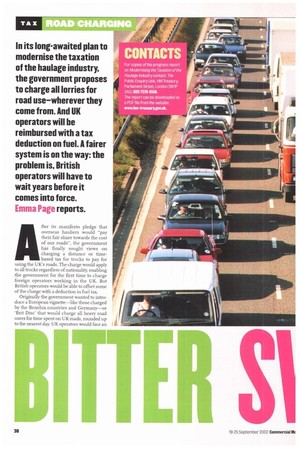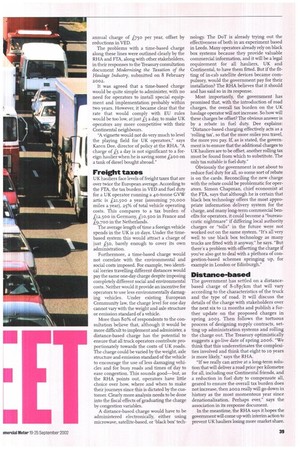ITER S‘ A fter its manifesto pledge that overseas hauliers would
Page 38

Page 39

If you've noticed an error in this article please click here to report it so we can fix it.
"pay their fair share towards the cost of our roads", the government has finally sought views on charging a distance or timebased tax for trucks to pay for using the UK's roads. The charge would apply to all trucks regardless of nationality, enabling the government for the first time to charge foreign operators working in the UK. But British operators would be able to offset some of the charge with a deduction in fuel tax.
Originally the government wanted to introduce a European vignette—like those charged by the Benelux countries and Germany—or 'Brit Disc' that would charge all heavy road users for time spent on UK roads, rounded up to the nearest day. UK operators would face an annual charge of /750 per year, offset by reductions in VED.
The problems with a time-based charge along these lines were outlined dearly by the RHA and FTA, along with other stakeholders, in their responses to the Treasury consultation document Modernising the Taxation of the Haulage Industry, submitted on 8 February 2002.
It was agreed that a time-based charge would be quite simple to administer, with no need for operators to install special equipment and implementation probably within two years. However, it became clear that the rate that would comply with EU rules would be too low, at just /5 a day, to make UK operators any more competitive with their Continental neighbours.
"A vignette would not do very much to level the playing field for UK operators," says Karen Dee, director of policy at the RHA. "A charge of /5 a day is not significant to a foreign haulier when he is saving some /20o on a tank of diesel bought abroad."
Freight taxes
UK hauliers face levels of freight taxes that are over twice the European average. According to the FTA, the tax burden in VED and fuel duty for a UK operator running a 4o-tonne G VW attic is /2.1,500 a year (assuming 70,000 miles a year), 25% of total vehicle operating costs. This compares to a tax burden of /12,500 in Germany, £10,500 in France and f9,700 in the Netherlands.
The average length of time a foreign vehicle spends in the UK is to days. Under the timebased system this would attract a charge of just /50, barely enough to cover its own administration.
Furthermore, a time-based charge would not correlate with the environmental and social costs imposed. For example, two identical lorries travelling different distances would pay the same one-day charge despite imposing completely different social and environmental costs. Neither would it provide an incentive for operators to use less environmentally damaging vehicles. Under existing European Community law, the charge level for one day cannot vary with the weight and axle structure or emission standard of a vehicle.
More than 80% of respondents to the consultation believe that, although it would be more difficult to implement and administer, a distance-based charge has the potential to ensure that all truck operators contribute proportionately towards the costs of UK roads. The charge could be varied by the weight, axle structure and emission standard of the vehide to encourage the use of less damaging vehicles and for busy roads and times of day to ease congestion. This sounds good—but, as the RHA points out, operators have little choice over how, where and when to make their journeys since this is dictated by the customer. Clearly more analysis needs to be done into the fiscal effects of graduating the charge by congestion variables.
A distance-based charge would have to be administered electronically, either using microwave, satellite-based, or 'black box' tech
nology. The DoT is already trying out the effectiveness of both in an experiment based in Leeds. Many operators already rely on black box systems because they provide valuable commercial information, and it will be a legal requirement for all hauliers. UK and Continental, to have them fitted. But if the fitting of in-cab satellite devices became compulsory, would the government pay for their installation? The RHA believes that it should and has said so in its response.
Most importantly, the government has promised that, with the introduction of road charges, the overall tax burden on the UK haulage operator will not increase. So how will these charges be offset? The obvious answer is by a rebate in fuel duty. Dee explains: "Distance-based charging effectively acts as a 'rolling tax', so that the more miles you travel, the more you pay. If, as is stated, the government is to ensure that the additional charges to UK hauliers are to be offset, another rolling tax must be found from which to substitute. The only tax suitable is fuel duty."
Obviously the government is not about to reduce fuel duty for all, so some sort of rebate is on the cards. Reconciling the new charge with the rebate could be problematic for operators. Simon Chapman, chief economist at the FTA, says that although he is certain that black box technology offers the most appropriate information delivery system for the charge, and many long-term commercial benefits for operators, it could become a "bureaucratic nightmare" if differing local authority charges or "tolls" in the future were not worked out on the same system. "It's all very well to use black box technology as many trucks are fitted with it anyway," he says. "But there's a problem with offsetting the charge if you've also got to deal with a plethora of congestion-based schemes springing up, for example in London or Edinburgh."
Distance-based
The government has settled on a distancebased charge of 8-18p /km that will vary according to the characteristics of the truck and the type of road. It will discuss the details of the charge with stakeholders over the next six to 12 months and publish a further update on the proposed charges in spring 2003. Then follows the tortuous process of designing supply contracts, setting up administration systems and rolling the charge out. The Treasury optimistically suggests a go-live date of spring 2006. "We think that this underestimates the complexities involved and think that eight to 10 years is more likely," says the RHA.
"If we really can arrive at a long-term solution that will deliver a road price per kilometre for all, including our Continental friends, and a reduction in fuel duty to compensate all, geared to ensure the overall tax burden does not increase, then 2002 really will go down in history as the most momentous year since denationalisation. Perhaps ever," says the association in its response document_ In the meantime, the RHA says it hopes the government will come up with interim action to prevent UK hauliers losing more market share.
































































































































































